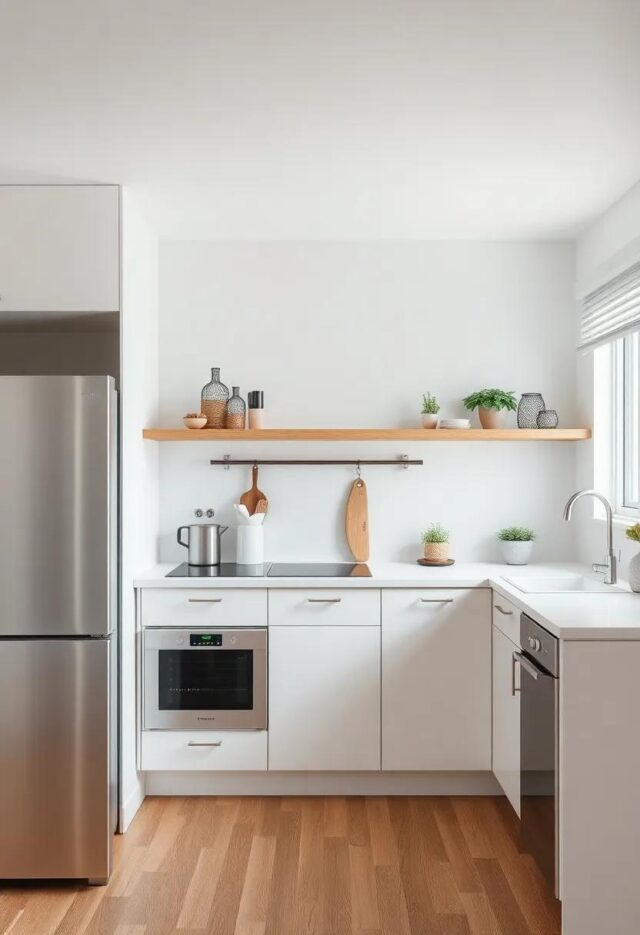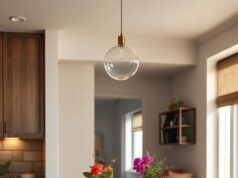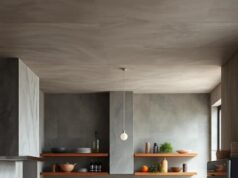In the heart of every home lies the kitchen,a bustling hub where culinary creations come to life and memories are stirred alongside simmering pots. However, for many, the dream of a spacious kitchen can be overshadowed by the reality of limited square footage. But fear not! A tiny kitchen doesn’t have to be a hindrance; it can be a canvas for creativity and clever design. In this article, we explore innovative layout ideas and smart storage solutions that will allow you to maximize functionality and style in your compact cooking space. Whether you’re a seasoned chef or a weekend warrior, these strategies will help you transform your small kitchen into an efficient and inviting oasis that works for you—not against you. Join us as we uncover the secrets to making every inch count and elevating your culinary experience, no matter the size of your kitchen.
Clever Use of Vertical Space to Create Extra Storage in your Tiny Kitchen
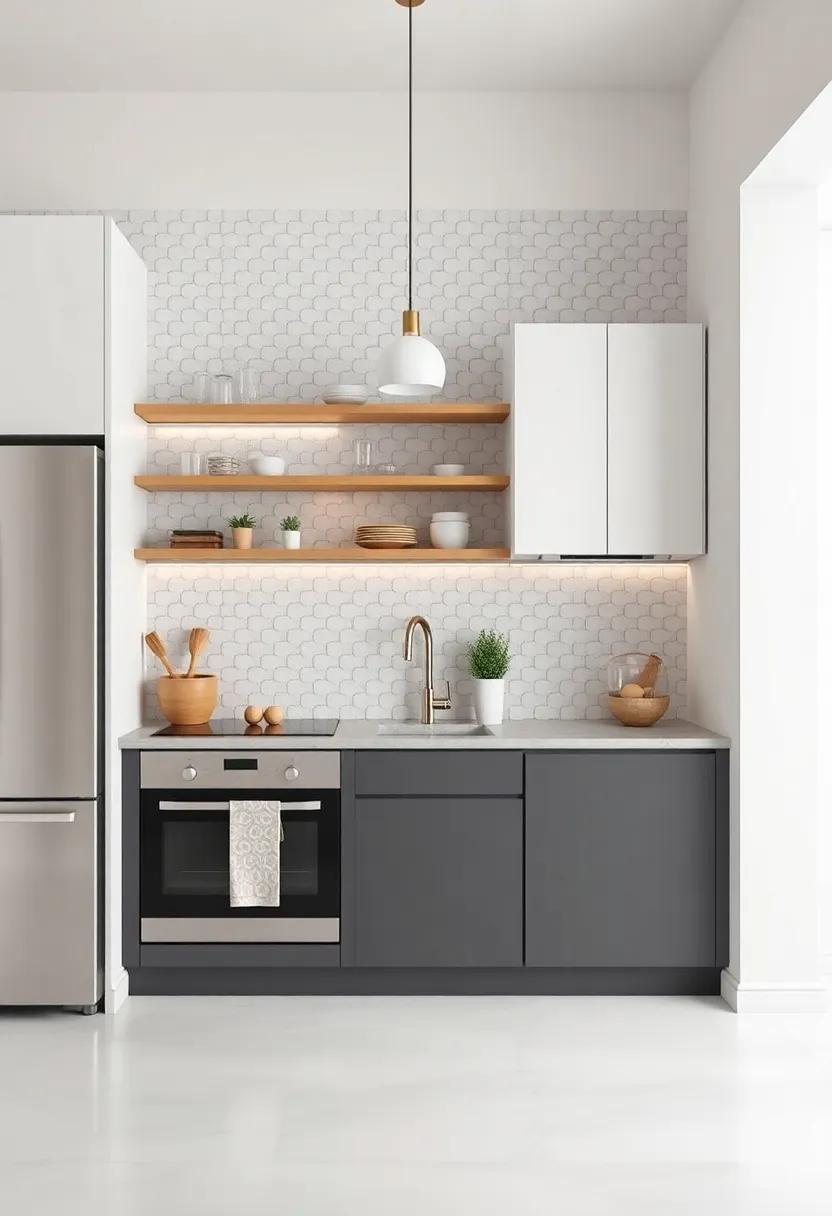
In a tiny kitchen,vertical space is often underutilized,yet it holds the key to unlocking additional storage solutions. By looking upwards, homeowners can transform their kitchen into a more functional area without sacrificing valuable floor space. As a notable example, installing open shelving above countertops provides easy access to frequently used items while displaying decorative dishware or plants, adding a touch of personality. Additionally, magnetic strips can be affixed to walls for hanging knives and metal utensils, ensuring that every inch of wall space is optimized for utilitarian purposes.
Another innovative approach involves using the backs of cabinet doors for storage; this can be a game changer in smaller kitchens. By incorporating hanging organizers or small racks, such as spice holders or cutting boards, these frequently enough-neglected areas become prime storage spots. Moreover, consider making use of stackable storage bins or tall pantry shelves that reach the ceiling, which can be organized by category or frequency of use.With a combination of creativity and strategic choices, vertical storage can dramatically elevate the functionality and aesthetics of a compact kitchen.
transforming Corners into Functional Zones Without Sacrificing Style
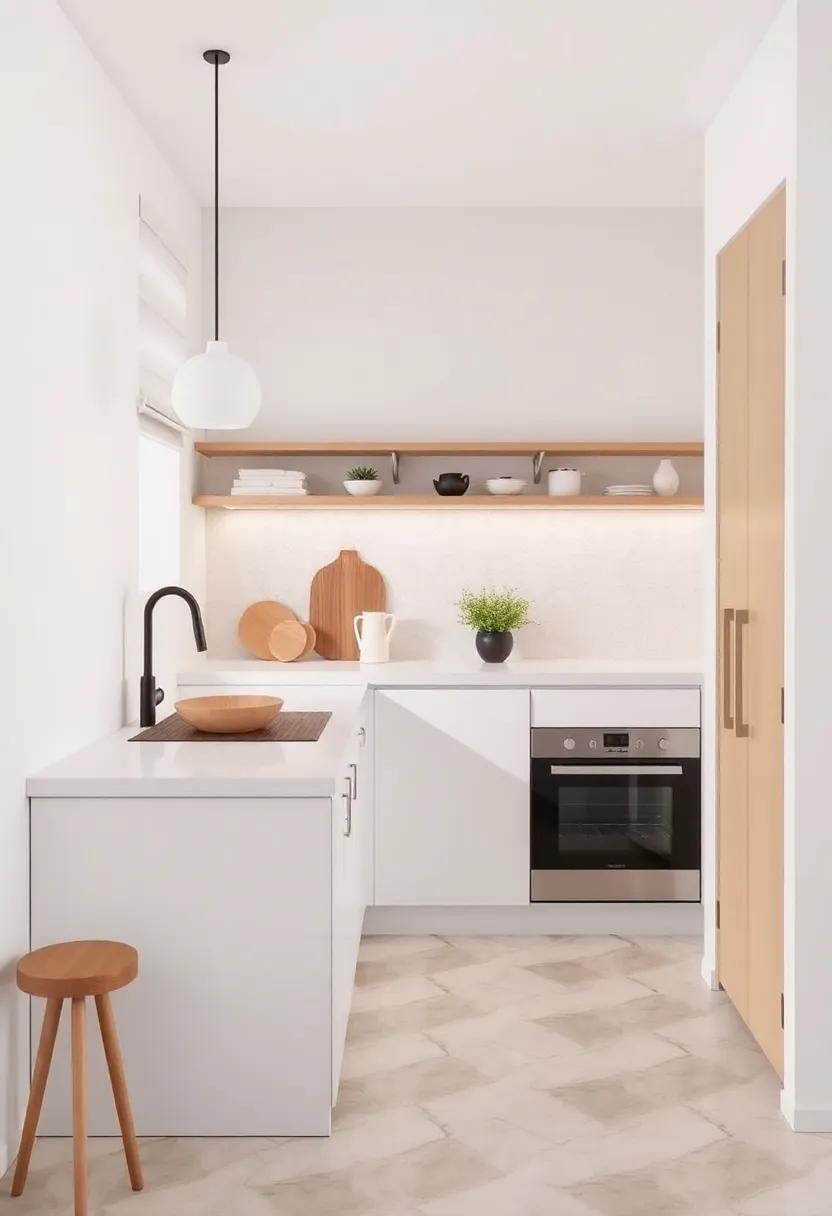
In tiny kitchens, corners often become wasted space, but with a little creativity, they can be transformed into functional zones that enhance both usability and aesthetics. Consider incorporating corner shelves or cabinets that not only maximize storage but also provide an opportunity to display decorative items, adding a personal touch to your design. Opt for open shelving on upper borders to create an airy feel while keeping essential items within reach. Remember,the goal is to balance practicality with style,making each corner work harder without sacrificing visual appeal.
Another innovative solution is making use of corner sinks or cooktops. This strategic placement opens up counter space and creates a more fluid work area, allowing for better flow in your kitchen. Use a sliding countertop or a foldable table that can expand into the corner when needed, providing extra workspace for meal prep without crowding the area. To make it even more inviting, incorporate cozy seating like a corner bench with storage beneath, providing the perfect nook for casual dining or enjoying a morning coffee while maximizing every inch of your kitchen.
Stylish Multi-functional Furniture That Complements Your Compact Kitchen
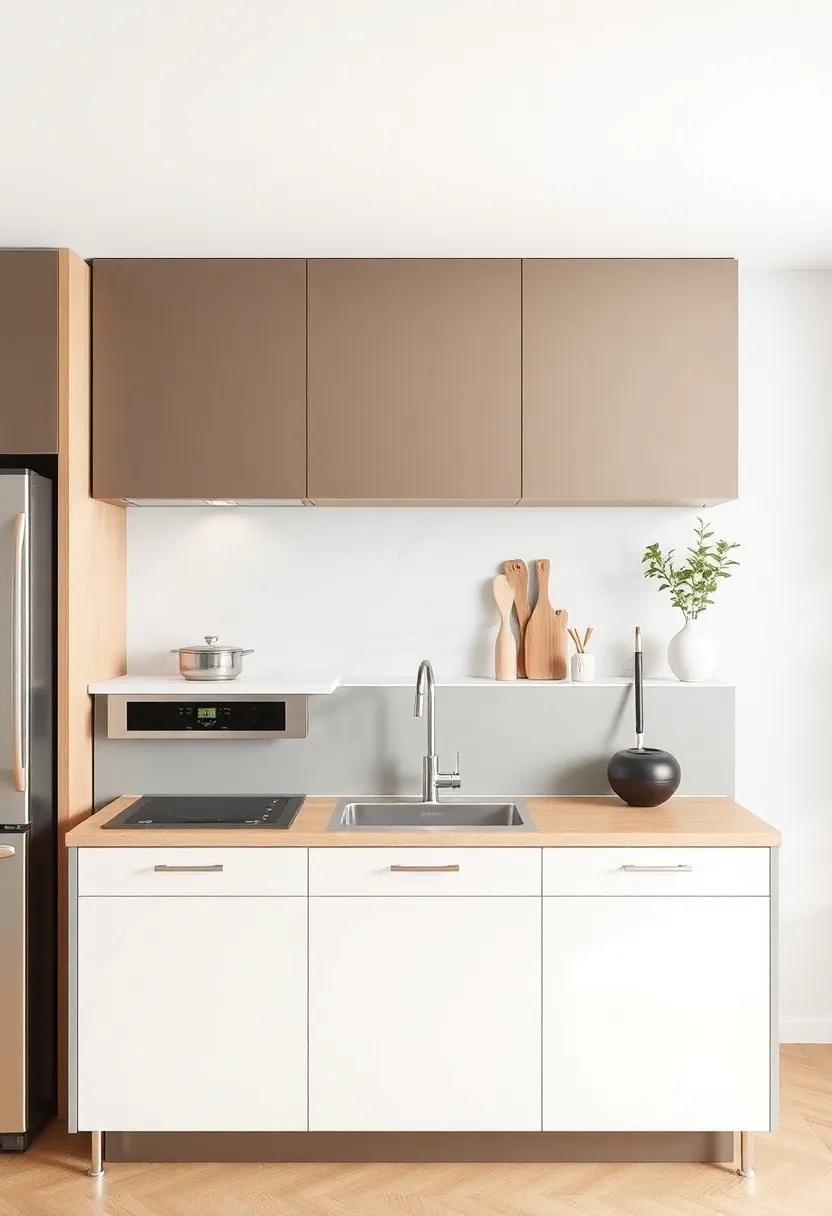
In a compact kitchen,every inch counts,and stylish multi-functional furniture can definitely help you maximize both space and aesthetics.Consider integrating foldable tables that can serve as both a dining area and a countertop extension.A bar cart on wheels not only provides additional storage for utensils and spices but can also be wheeled away when extra space is needed.Look for stools that can tuck neatly under a table or island, keeping your kitchen uncluttered while offering extra seating for gatherings.
When selecting furniture, embrace modular designs that can be rearranged according to your needs. Use a kitchen island with built-in shelving to store your cookbooks and cookware, while the top surface can act as a preparation and serving area.Another great option is a bench with hidden storage; this keeps items like pots and pans neatly out of view but easily accessible when needed. The combination of smart design and stylish finishes can transform your compact kitchen into a space that is both functional and visually appealing.
Illuminating Your Tiny Kitchen: Choosing the right Lighting Solutions
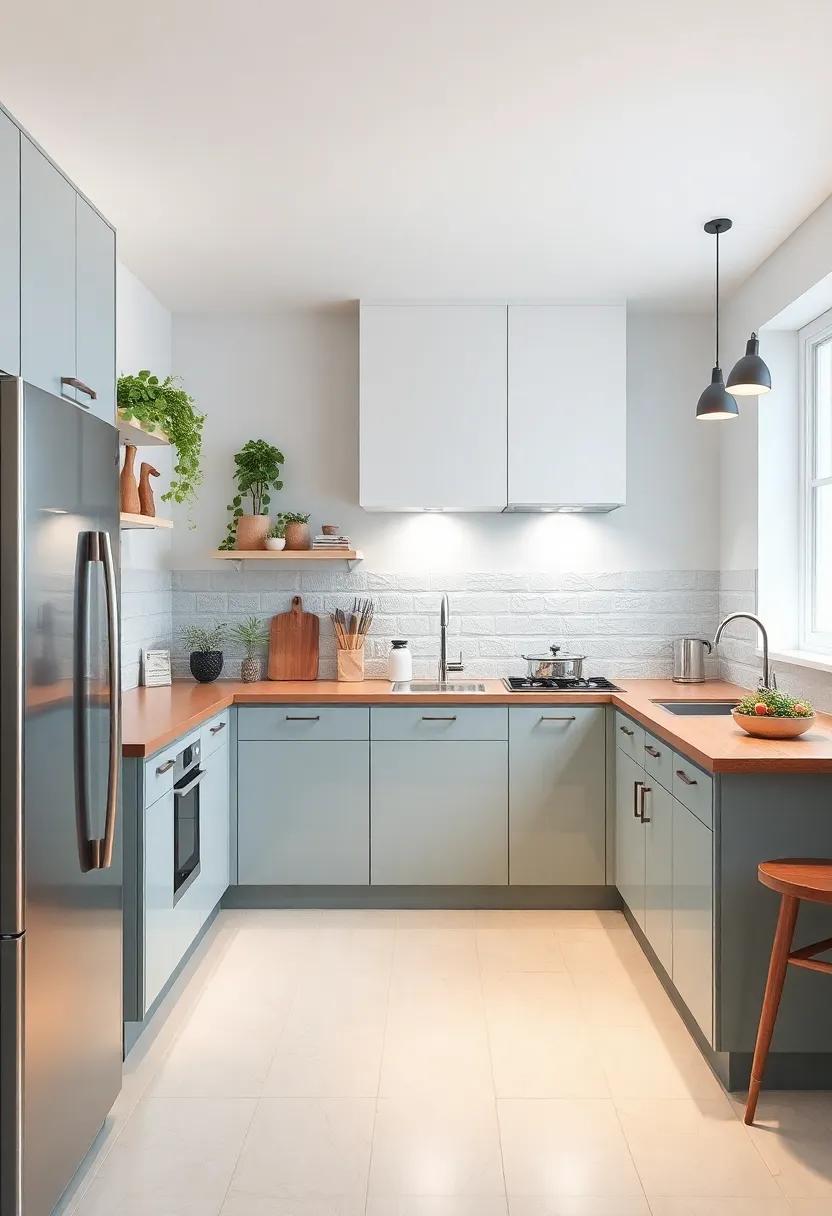
Good lighting can transform a cramped kitchen into a vibrant culinary hub. To enhance functionality and aesthetics in your tiny kitchen, consider a layered approach to lighting. Start with ambient lighting,which provides an overall glow without harsh shadows. Task lighting is essential for work areas, such as countertops and stoves, allowing you to chop, mix, and cook with precision. don’t overlook accent lighting, which adds warmth and character, spotlighting decorative elements or kitchenware to create a personalized space.
When selecting fixtures, prioritize compact options that maximize your ceiling height and wall space. Here are some ideas to incorporate:
- Under-Cabinet Lights: Illuminate work surfaces without occupying valuable overhead space.
- Pendant Lights: Hang a single stylish pendant over a prep area or eat-in counter to create a focal point.
- Recessed Lighting: Install these flush fixtures in the ceiling for a sleek look that saves headroom.
To help visualize your options, consider the following table of recommended lighting types and their key features:
| Lighting Type | Best For | key Feature |
|---|---|---|
| Under-Cabinet Lights | Countertops | Space-saving design |
| Pendant Lights | Prep areas | visual focal point |
| Recessed Lighting | Overall illumination | Seamless integration |
Incorporating Open Shelving for Aesthetic Appeal and Easy Access
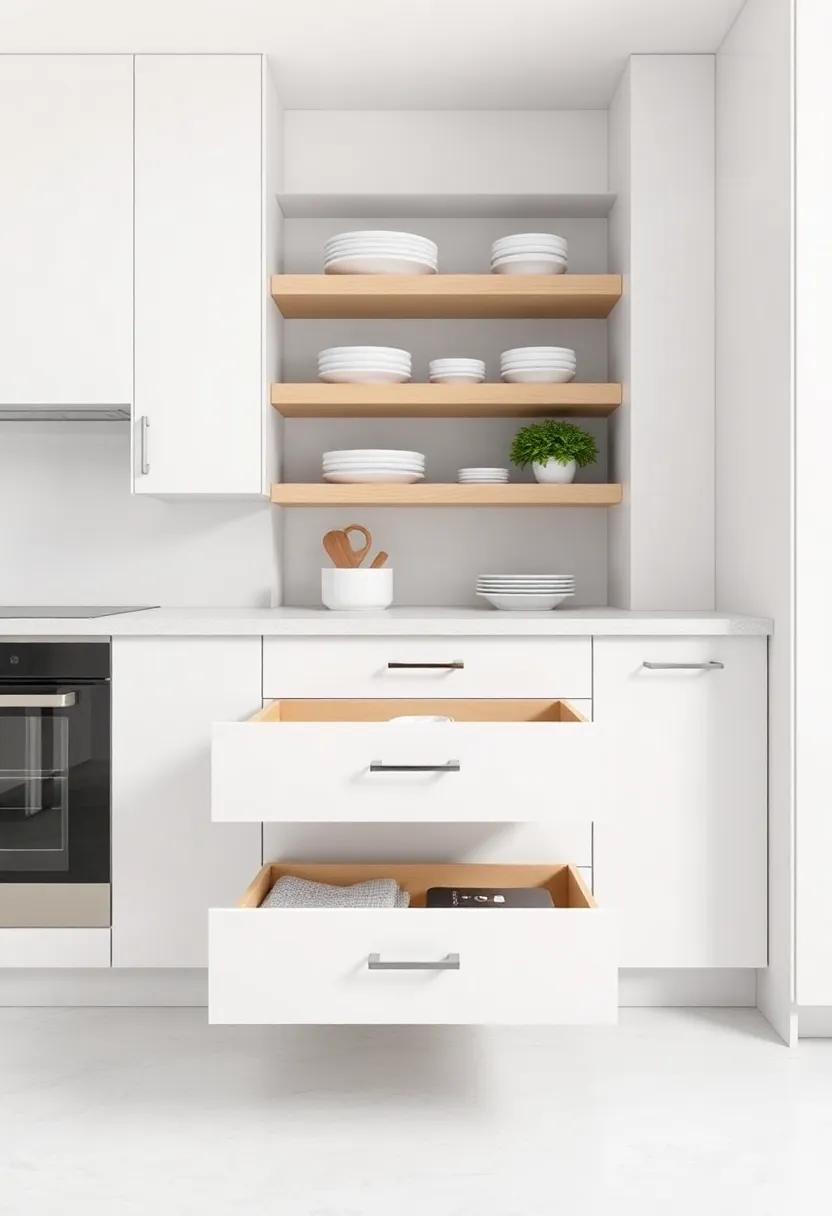
Open shelving offers a delightful blend of aesthetics and functionality in a compact kitchen.By removing upper cabinets and replacing them with shelves, you can instantly create a more open and inviting atmosphere. Display your favorite dishes and glassware, allowing them to serve as artful decor while keeping essentials within arm’s reach. The key to maximizing this space is to select versatile items that are both beautiful and practical, such as ceramic bowls, colorful spices, or stylish jars that capture your personality.
To ensure your open shelves remain organized and visually appealing, consider categorizing the items you showcase. Aim for a balanced look by mixing taller and shorter objects,and use decorative baskets to conceal lesser-used utensils or pantry items. Below is a simple guideline to help you curate your shelving:
| Category | Examples |
|---|---|
| Dishes | Plates, bowls, cups |
| Spices & Oils | Glass jars, bottles |
| Cookbooks | Cookbooks, recipe cards |
| Decorative Items | Plants, artwork |
utilizing Pull-Out Drawers for Optimal space Management
In the realm of compact kitchens, pull-out drawers emerge as superheroes of space management, turning the customary cabinet into a treasure trove of organized storage. Unlike deep, static shelves where items risk disappearing into the abyss, these drawers glide open with ease, allowing immediate access to your kitchen essentials. Consider the following benefits of implementing pull-out drawers:
- Accessibility: Everything is within arm’s reach, reducing wasted time and effort.
- Maximized Storage: Utilize every inch of space, from narrow cabinets to under-the-sink areas.
- Customizable Spaces: Tailor drawers for specific needs, whether it’s for pots, pans, or pantry staples.
Moreover, to elevate your kitchen’s functionality, integrate various pull-out drawer styles into the design. This could include deep drawers for bulky items, shallow ones for utensils, or even small compartments for spices. A well-planned layout allows effortless association, ensuring you can maintain a clutter-free habitat. Below is a quick reference table highlighting optimal drawer configurations for different kitchen items:
| Drawer Type | Suggested Use |
|---|---|
| Deep Pull-Out | Cookware & Bakeware |
| Shallow Pull-Out | Utensils & Cutlery |
| spice Rack Drawer | Herbs, Spices & Oils |
| Pantry Pull-Out | Canned Goods & Snacks |
Creative Solutions for Small Appliances That Maximize Counter Space
small kitchen spaces frequently enough require inventive thinking, especially when it comes to utilizing small appliances that can clutter your countertop. One effective way to enhance functionality without sacrificing style is by integrating appliances that serve multiple purposes. As an example, consider a multi-cooker that can function as a pressure cooker, slow cooker, and rice cooker all in one. This not only saves space but also limits the number of appliances you need to store. Additionally,using a wall-mounted pot rack can free up counter space by allowing you to suspend cooking utensils and pots while keeping frequently used small appliances,like toasters and blenders,easily accessible in designated areas.
Another innovative approach is investing in appliance garages—small built-in cabinets specifically designed to house smaller devices while keeping them hidden from view. This helps create a clean, uninterrupted look across your countertops. You can also explore using stackable appliances such as a toaster oven coupled with a coffee maker, which can sit atop one another without occupying additional surface area. To make this even more functional, integrate sliding shelves or pull-out drawers in your cabinetry to hold appliances that are less frequently used, allowing them to be effortlessly stowed away when not in use. here’s a simple comparison of various space-saving options:
| Appliance | Space-Saving feature | Functionality |
|---|---|---|
| Multi-Cooker | Combines multiple cooking methods | Pressure, slow, and rice cooking |
| appliance Garage | Conceals appliances | keeps counters tidy |
| Stackable Appliances | Minimizes footprint | Toasting and brewing |
Designing a Cozy Breakfast Nook in a Limited Area
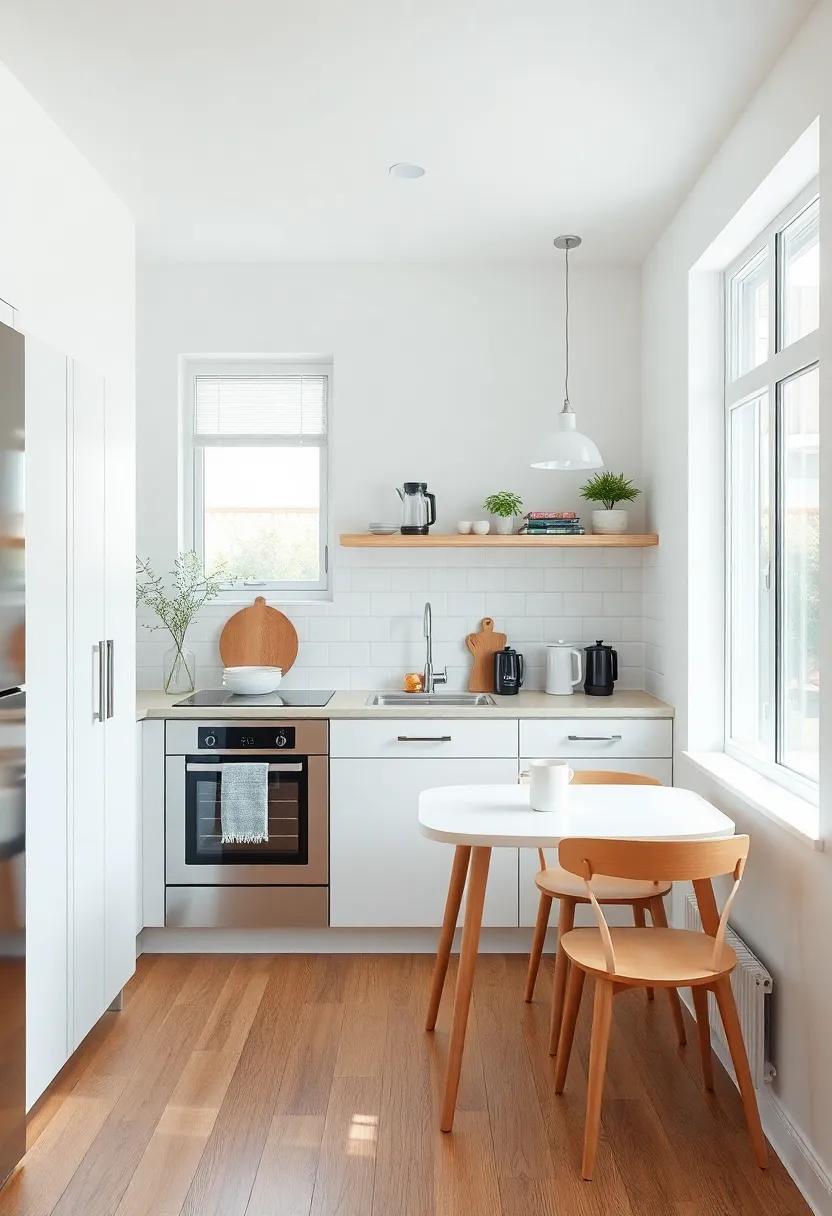
Creating a warm and inviting breakfast nook in a limited area can transform your mornings and enhance the charm of your tiny kitchen. Start by choosing a compact table that fits snugly against a wall or in a corner, allowing for efficient movement. Consider a round table to encourage conversation and make the area feel less cramped.Choose benches or stools with built-in storage to minimize clutter while maximizing seating capabilities. Surround the nook with soft, flowing curtains for a touch of warmth and to keep the space feeling airy.
A few additional elements can further enhance the coziness of your nook. Utilize shelves or hanging racks for decorative dishware and plants, keeping essentials within reach while adding personality to the space. Consider adding multifunctional furniture, such as a drop-leaf table that can expand when needed and fold away when not in use.To complete the look, incorporate soft lighting thru pendant fixtures or wall sconces to create an inviting atmosphere even during early hours. With these elements, your breakfast nook can become a delightful retreat for enjoying meals, reading, or sipping coffee.
Crafting a Galley Kitchen with Efficient Workflow in Mind
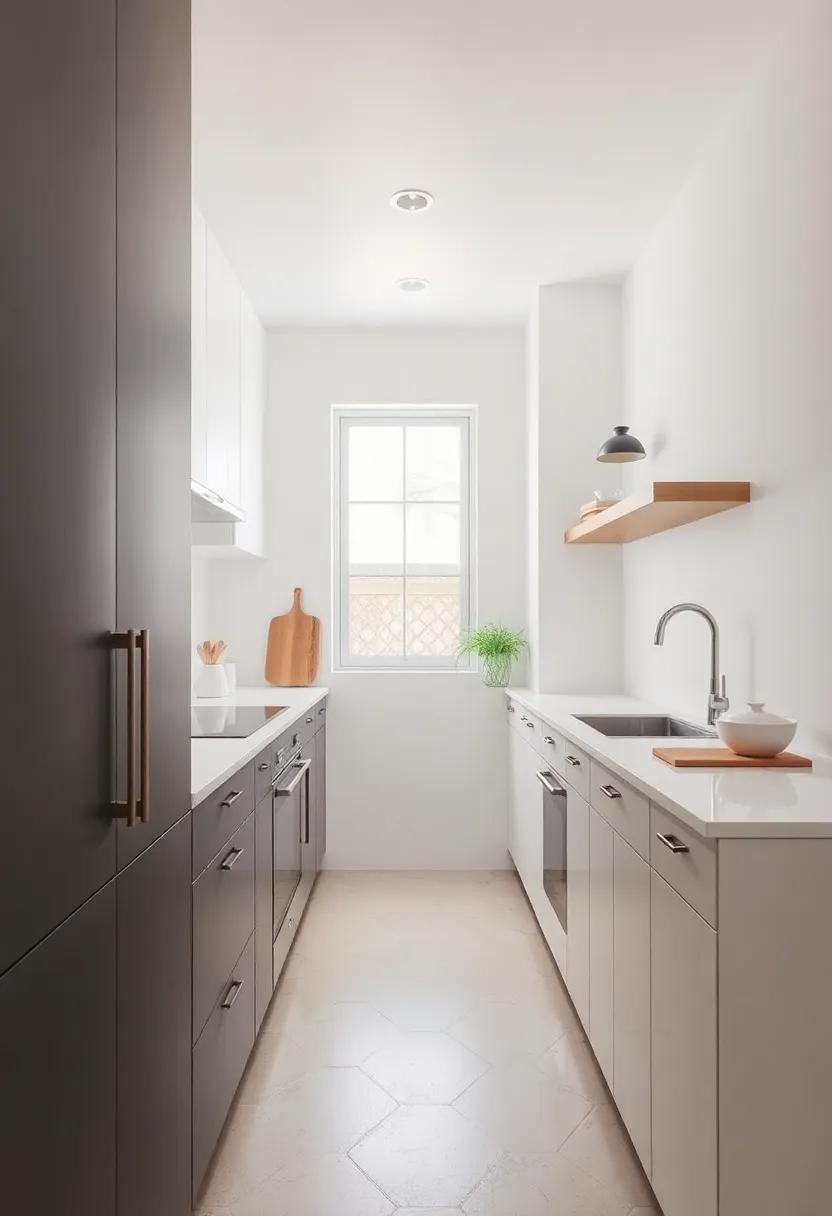
When designing a galley kitchen, prioritizing efficiency can transform even the coziest of spaces into a culinary haven. One of the cornerstones of this layout is the work triangle, which optimally places the refrigerator, stove, and sink in a triangular arrangement, eliminating unnecessary movements during cooking. Additionally, incorporating open shelving allows easy access to frequently used items while creating an illusion of openness, making the kitchen feel larger. You can further enhance functionality by using the walls; consider adding hangers for pots and pans, or magnetic strips for knives, to keep countertops clutter-free.
Incorporating multi-functional furniture can also significantly enhance workflow. A foldable table can serve as both a prep surface and dining space, while deep drawers with internal organizers utilize vertical space effectively. Consider including a rolling cart that can slide into tight spaces but be pulled out when needed, providing extra storage and mobility. Below is a table summarizing space-saving hacks that can maximize functionality in a galley kitchen:
| hack | Description |
|---|---|
| Corner Shelves | Utilize corner space with tiered shelving for spices and ingredients. |
| Pull-Out Pantry | A narrow pull-out system can fit in small spaces, maximizing storage. |
| Under-Cabinet lighting | Brightens workspace and creates a more inviting atmosphere. |
Incorporating Glass Doors to Enhance Light and depth in Your Kitchen
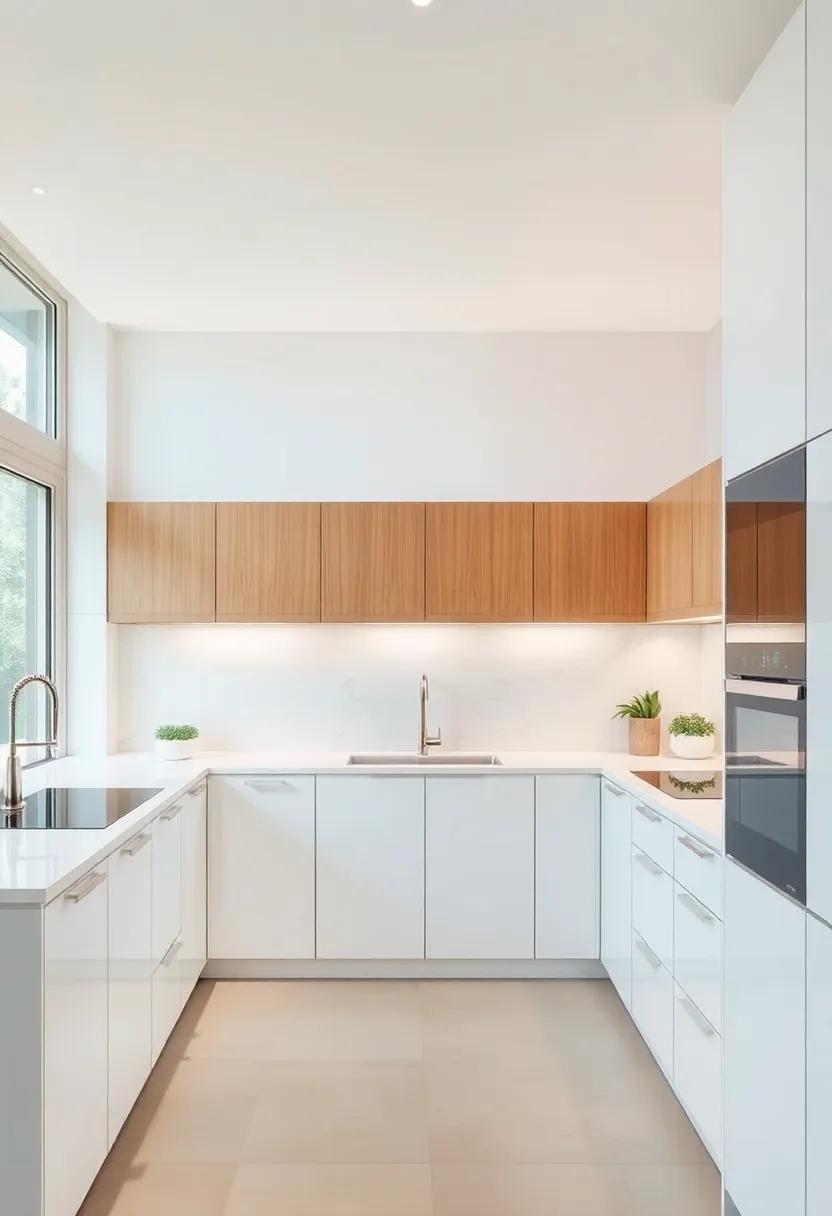
incorporating glass doors in your kitchen design can transform the ambience, creating a sense of openness while allowing natural light to permeate the space. Obvious cabinetry is an elegant choice for showcasing beautiful dishware and adding visual interest without overwhelming the room.Here are some benefits of using glass doors:
- Enhanced Illumination: Glass allows light to bounce around, brightening even the smallest kitchens.
- Visual Depth: Reflective surfaces create an illusion of more space, making your kitchen appear larger.
- Showcase Your Style: Displaying carefully curated items adds a personalized touch to your decor.
Additionally, glass doors can be strategically placed to blend the kitchen with adjacent living areas, promoting an open-concept feel. Consider incorporating a few key design elements to maximize efficiency:
| Design Element | benefit |
|---|---|
| Frosted Glass Panels | Offers privacy while still allowing light to filter through. |
| Sliding Glass Doors | Save space compared to traditional hinged doors and create a seamless connection to the outdoors. |
| Accent Lighting | Highlight glass-front cabinetry and enhance architectural features. |
Embracing Modular Designs for Versatile Cooking and Dining Areas
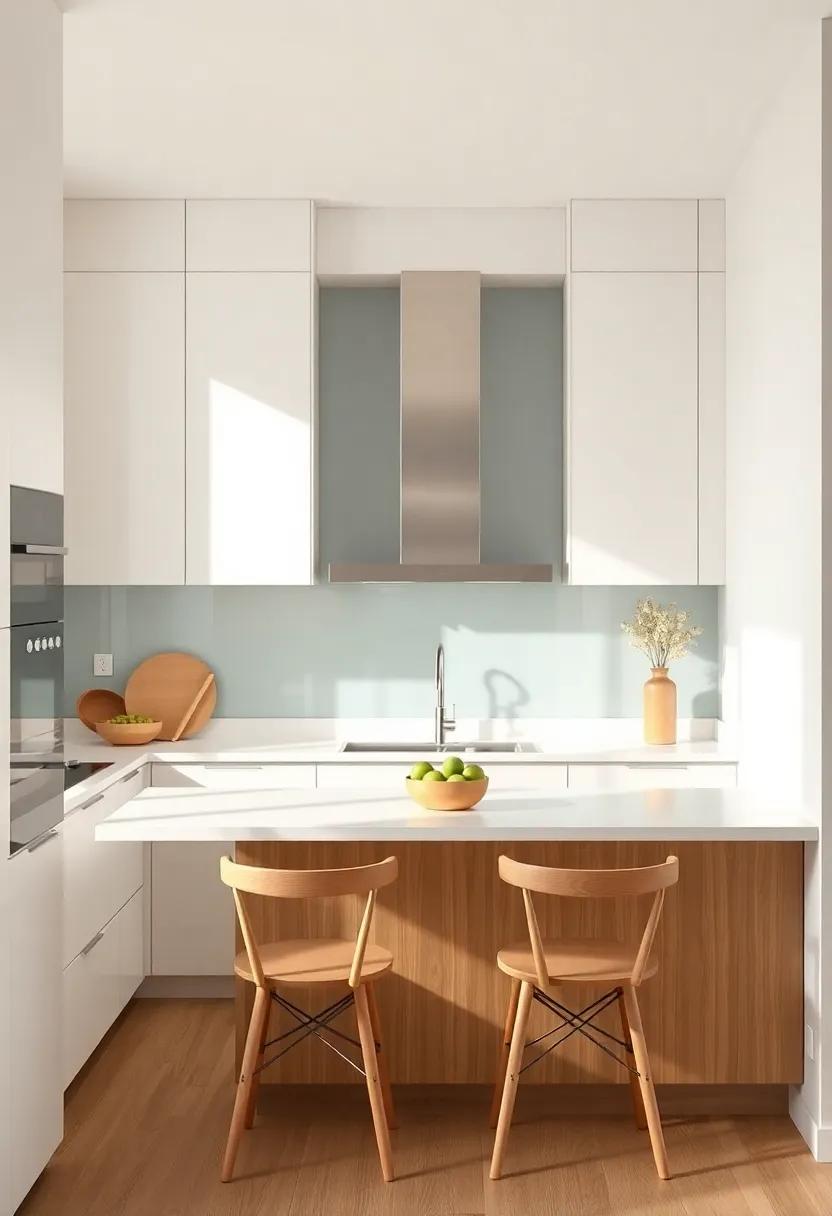
In the quest for efficient use of space, modular designs have emerged as a game-changer for both cooking and dining areas. These versatile setups can transform tiny kitchens into multifunctional spaces that adapt to your daily needs. Opt for modular cabinetry that allows you to rearrange components easily, ensuring that your kitchen evolves alongside your lifestyle. Consider incorporating elements such as:
- Expandable tables that can accommodate guests without monopolizing space.
- Foldable stools that can be stowed away when not in use.
- Sliding pantry shelves that maximize storage while allowing easy access to your essentials.
Moreover,the beauty of modular designs is their ability to create a seamless flow between cooking and dining experiences. You can achieve this through open shelving that doubles as decor, giving you both storage and aesthetics in one choice.Utilizing multi-functional islands that serve as prep stations and dining counters can also enhance social interactions while cooking. As you plan your layout, consider a few additional features:
| Feature | Benefit |
|---|---|
| Integrated appliances | Reduce clutter and maintain a sleek design. |
| Smart storage solutions | Maximize every inch of space effectively. |
Color Psychology: Choosing Palettes that Make Your Kitchen Feel Larger
Choosing the right color palette can significantly influence the perception of space in your kitchen. Light colors, such as soft whites, pastels, and pale grays, reflect natural light and create an airy feel, making the room appear larger. Consider incorporating neutral shades on your cabinets and walls, while using darker colors for accents, which can add depth without overwhelming the space. Some effective color combinations may include:
- Soft Cream and Light Gray: This combination provides warmth while keeping the space feeling open.
- Pale Blue with Shining White Accents: This palette enhances a retro vibe, creating a refreshing atmosphere.
- Mint Green with Mild Beige: This adds a touch of color without overpowering the room.
Additionally, the use of color can also impact how we arrange elements in the kitchen. Introducing monochromatic schemes can create a seamless look, making cabinets, countertops, and appliances blend together, thereby minimizing visual interruptions. Consider utilizing shiny finishes on surfaces, as they reflect light and give the illusion of a more extensive area. Here’s a quick overview of how different color aspects can transform your space:
| Color Type | Affect on Space |
|---|---|
| Light colors | Expand visual space and increase brightness |
| Dark Colors | Add depth and can create a cozy feel in small areas |
| Accent Colors | Break monotony and add interest without crowding |
Innovative Ideas for Minimizing Clutter and Keeping Surfaces Clear
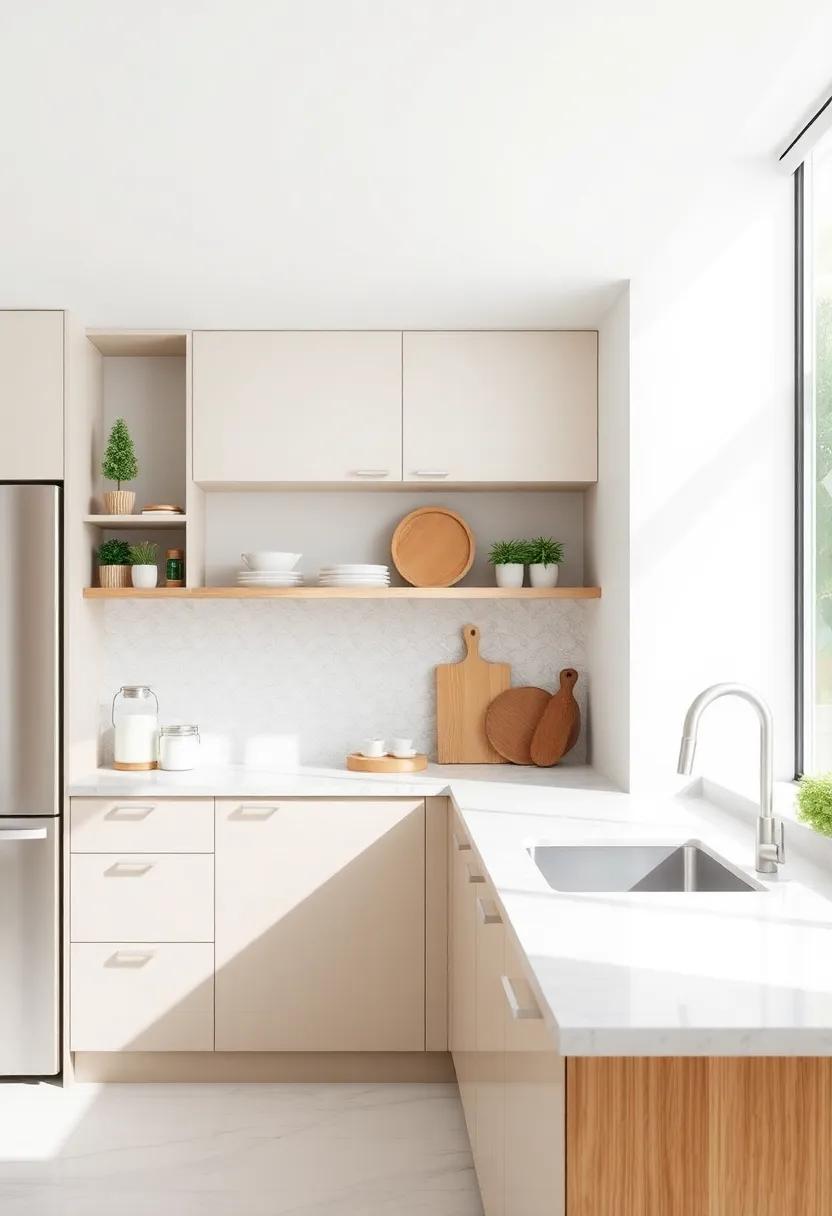
Keeping your tiny kitchen organized is essential for maximizing it’s functionality. One innovative strategy is the use of multi-functional furniture. Look for pieces like a kitchen island that doubles as a dining table or stools that can be tucked neatly underneath counters when not in use. Additionally,consider installing floating shelves to utilize vertical space efficiently. These shelves not only offer a place for spices and cookbooks but also create visual interest without overcrowding surfaces.
Another clever approach is to implement storage solutions that blend seamlessly into the design of your kitchen. Drawer dividers can keep utensils tidy, while magnetic strips can hold knives and other metal tools on the wall, freeing up counter space. Use decorative baskets and bins to store items aesthetically; ensure they are labelled for easy access. A well-structured organization system can definitely help minimize clutter significantly, making your kitchen not only more functional but also visually appealing.
Incorporating Reflective Surfaces for an Illusion of Spaciousness
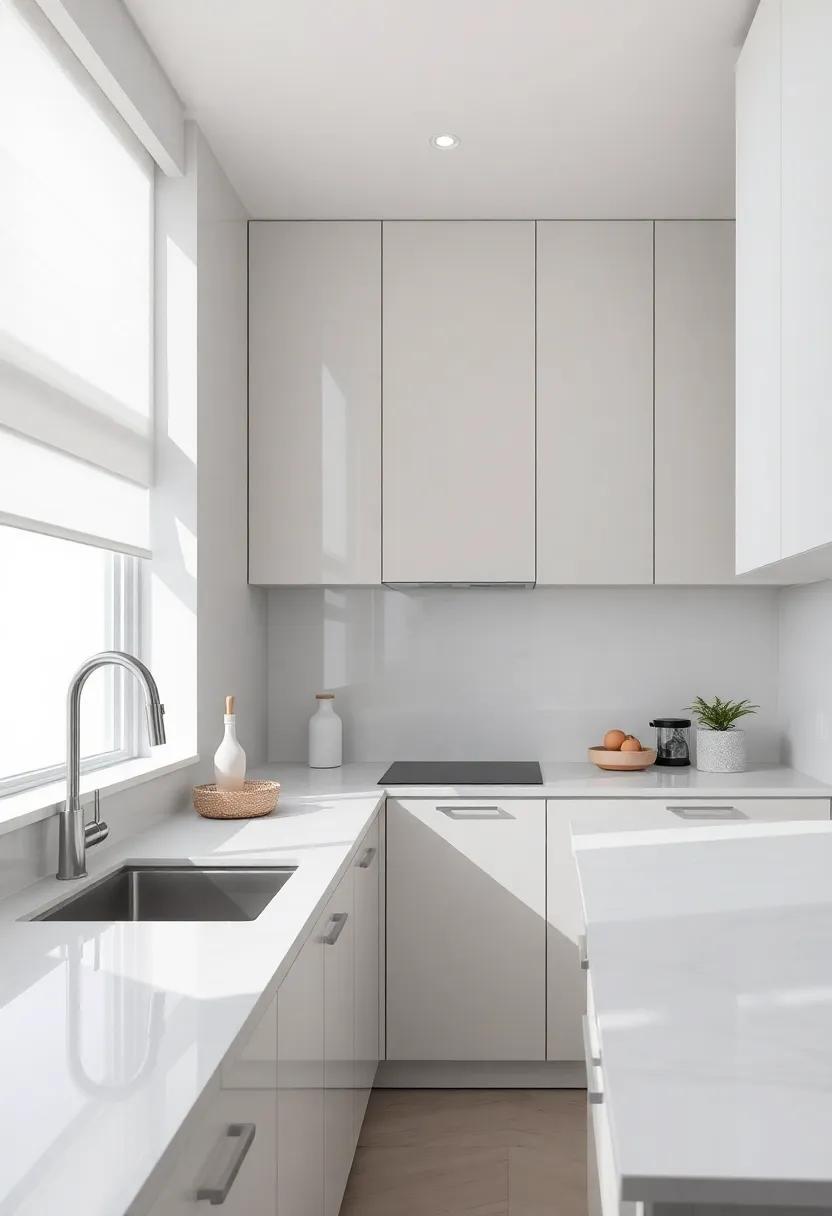
One of the most effective strategies to create an illusion of space in a tiny kitchen is through the clever use of reflective surfaces. Incorporating elements such as mirrored backsplashes, shiny cabinetry, or high-gloss countertops can significantly enhance the light within the room, making it appear larger and more open. These surfaces can bounce natural light around, softening shadows and adding depth to your kitchen. Consider selecting features like:
- Mirrored Cabinet doors: Reflect light and provide a stylish aesthetic.
- Glass Shelving: Keep the visual flow uninterrupted while showcasing decorative items.
- Stainless Steel Appliances: Their sleek surface reflects light, contributing to a brighter environment.
To further amplify this effect,you might opt for a light color palette combined with reflective elements. As an example, pairing white or pale cabinetry with polished surfaces creates a seamless look that draws the eye upward, making ceilings feel higher. A strategically placed wall-mounted mirror or a reflective backsplash can effectively create a focal point, simulating more area than actually exists. Here’s a simple table showcasing different reflective options and their benefits:
| Reflective Surface | Benefit |
|---|---|
| Mirrored Backsplash | Enhances light and depth |
| Shiny Countertops | Creates a modern look |
| Glossy Cabinet finishes | Adds elegance and dimension |
Strategic Placement of Accessories to Elevate Your Kitchen Aesthetics
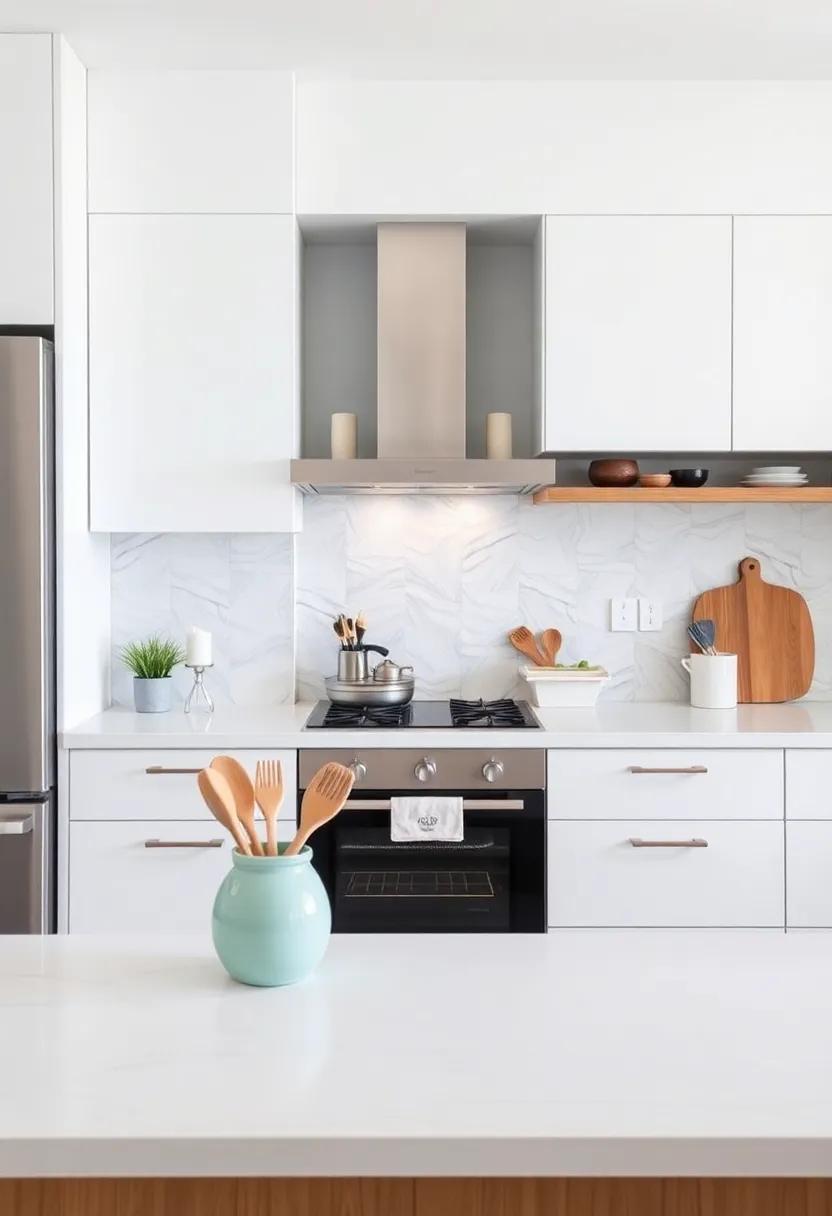
in a tiny kitchen, every inch counts, and the strategic placement of accessories can transform the space from cramped to cozy. Consider incorporating open shelving to display beautiful dishware, colorful cookbooks, or charming potted herbs. These accessories not only serve a practical purpose but also add a touch of personality to your kitchen. Enhance your culinary nook by utilizing hooks for hanging pots and pans, which not only frees up valuable counter space but also creates an inviting visual display. Add decorative trays or baskets to organize countertop items, ensuring that everything has its designated spot while contributing to the overall aesthetic.
Another creative strategy involves using multi-functional accessories that blend style with utility.As an example, a decorative kitchen cart can serve as a mobile workspace or extra storage while showcasing your favorite kitchen accessories. To ensure harmony in your design, choose color palettes and materials that complement each other; metallic accents can give a modern twist, while rustic wood finishes bring warmth. Consider using a small table with storage options like drawers or shelves, perfect for both dining and additional workspace. Incorporating these elements thoughtfully can turn your tiny kitchen into a thriving hub that feels both spacious and stylish.
Emphasizing a Minimalist Design for Greater Functionality and Elegance
in a tiny kitchen, every square inch counts, making it essential to embrace a design language that prioritizes simplicity while enhancing usability. A minimalist approach frequently enough leads to a more open and inviting atmosphere, allowing you to focus on what truly matters: cooking and sharing meals. By reducing visual clutter and opting for streamlined shapes, you can create a space that feels larger and more functional. Consider using multifunctional furniture or built-in appliances that seamlessly integrate into your kitchen’s layout,ensuring that each element serves a purpose without overwhelming the overall aesthetic.
To further embody this ethos, think about employing a neutral color palette with natural materials to evoke an understated elegance. Subtle accents, such as a few well-placed herbs or chic dishware, can inject personality without compromising the clean lines. Here are a few key elements to consider when designing your minimalist kitchen:
- Decluttered Countertops: Keep surfaces clear by incorporating smart storage solutions.
- Integrated Devices: Use built-in appliances to reduce visual noise.
- Open Shelving: Display only your favorite and most-used items for a personal touch.
- Efficient Layout: Optimize the kitchen triangle (sink,stove,refrigerator) for enhanced workflow.
Smart Color contrast Techniques to Define Areas in Your Tiny Kitchen
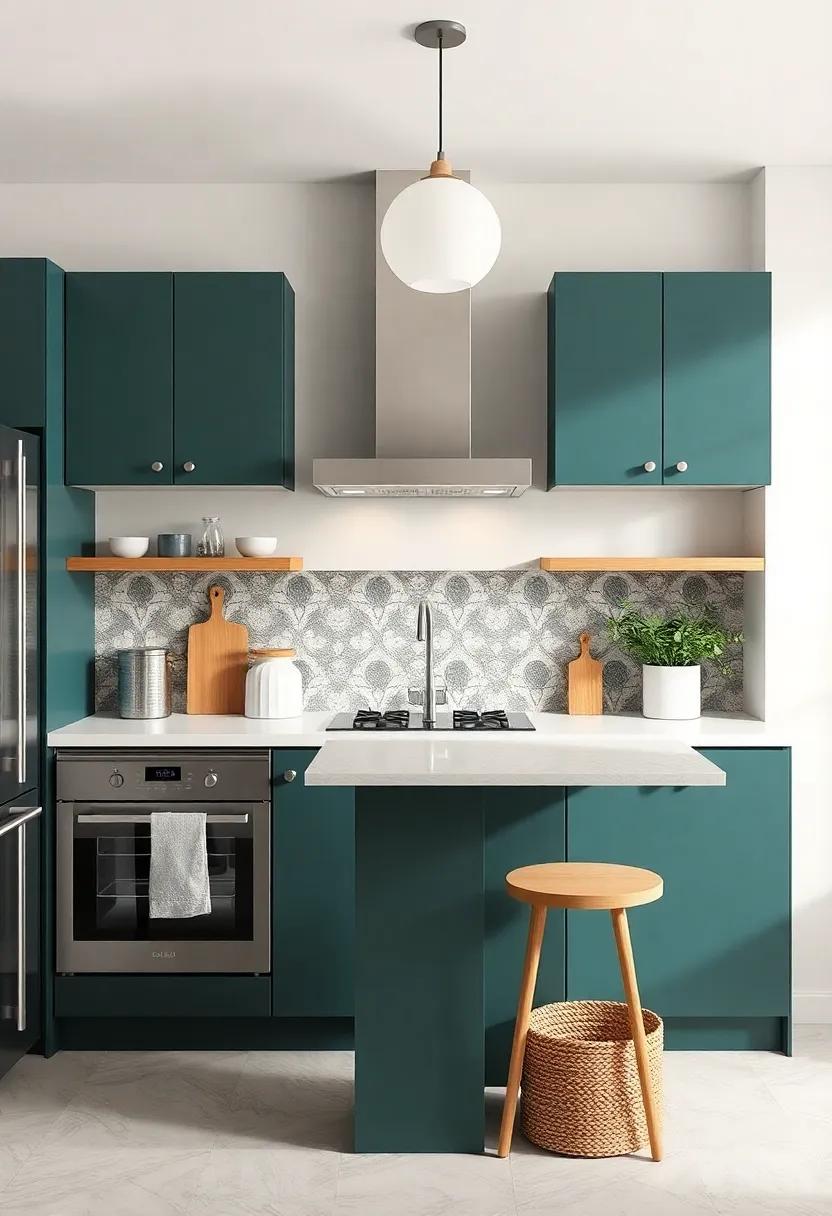
Using colors wisely can completely change the perception of your tiny kitchen. By adopting smart color contrast techniques, you can effectively define different zones within the space. Consider painting the cabinetry in a deep navy while the walls are a soft white; this contrast not only visually separates areas but also creates a modern and refined feel.adding colored backsplashes, such as warm yellows or greens in cooking zones, can stimulate creativity and make cooking more enjoyable.
Utilizing contrasting colors in textiles—like tablecloths, kitchen towels, and even decorative items—can further delineate spaces without overwhelming the eye. For instance, punchy red accents against neutral kitchenware can add a vibrant touch to the dining area. Don’t overlook the impact of lighting; using warm-toned bulbs over a breakfast nook and cooler tones in prep areas can subtly signal shifts in function. To sum it up, experimenting with color not only enhances the aesthetics but also elevates the practicality of your compact cooking space.
Creating a Custom Layout That Works for Your Cooking Habits and Lifestyle
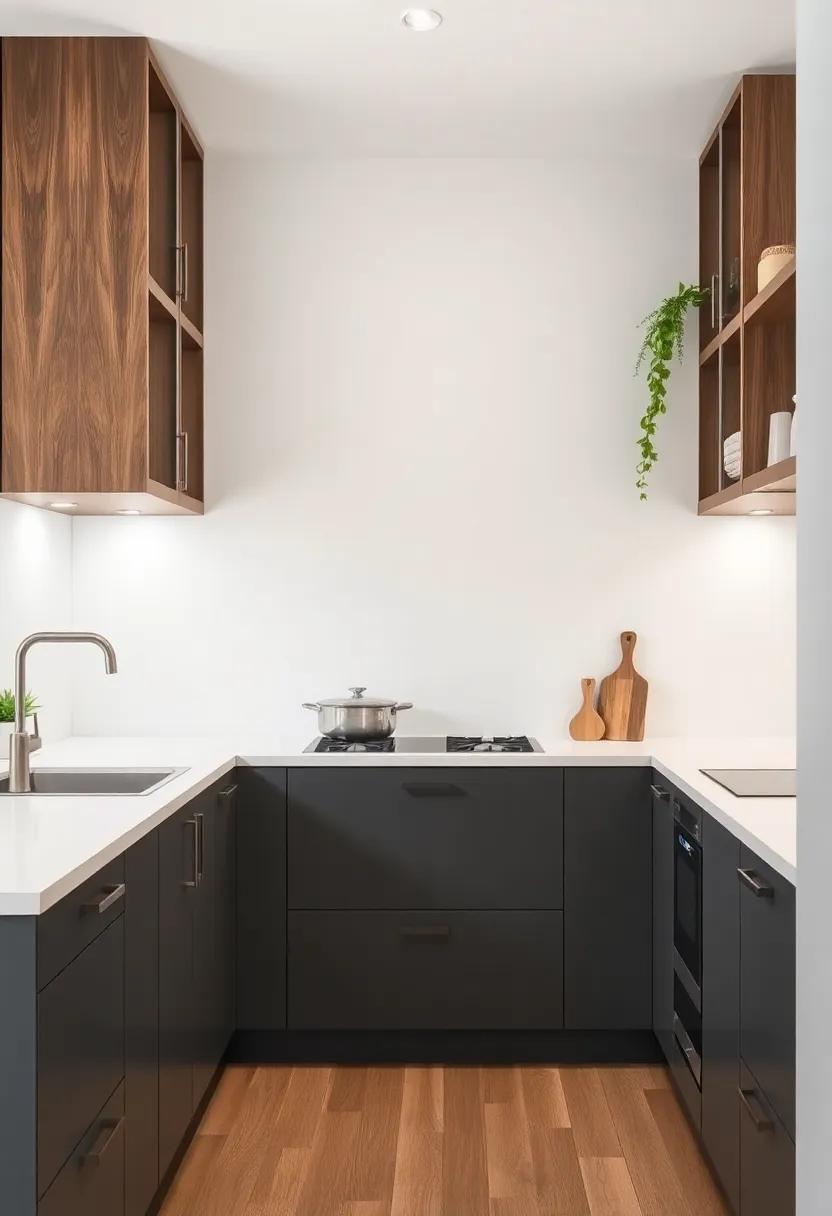
When designing a kitchen layout, it’s essential to take into account your personal cooking habits and overall lifestyle. A functional space not only enhances your cooking experience but also makes daily tasks more efficient. Consider incorporating elements such as:
- Open Shelving: This allows easy access to frequently used items, promoting a more streamlined workflow.
- Mobile Carts: These can serve as extra prep space or storage, easily reconfigured to suit your needs.
- Vertical Storage Solutions: Utilize wall space with hooks and magnetic strips for pots, pans, and utensils.
Additionally, the kitchen triangle—comprising the stove, sink, and refrigerator—should be adjusted to match your cooking routine. If you often entertain, create a layout that encourages social interaction by incorporating a small island or a breakfast bar. Table configurations can reflect your preferences:
| Function | Recommended Layout |
|---|---|
| Cooking Alone | Linear setup with clear access to all zones |
| Family Cooking | Galley style with shared prep areas |
| Hosting Guests | U-shaped design for conversation and collaboration |
Insights and Conclusions
As we conclude our journey through the world of tiny kitchen transformations, it becomes clear that limited space doesn’t equate to limited possibilities.By embracing creativity and clever design principles, we can turn even the most compact kitchens into highly functional culinary havens. Whether it’s through the strategic use of vertical storage, multifunctional furniture, or inspiring color palettes, every inch can be optimized to serve your cooking needs while reflecting your personal style.
Remember, the heart of any home beats strongest when it is indeed a reflection of its inhabitants, irrespective of size. So,as you embark on your own kitchen innovation adventure,don’t hesitate to experiment,adapt,and personalize your space. After all, your tiny kitchen is not just a place to prepare meals—it’s a canvas for your culinary creativity. Embrace the challenge, and watch as your small space transforms into a big statement. Happy cooking!

